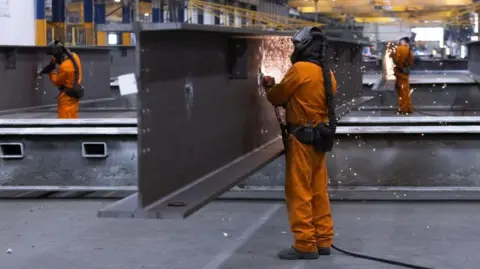BBC news
Setting US tariffs in the UK steel would be “negative” for both countries, the business secretary said.
Jonathan Reynolds told the BBC in the United Kingdom and the US have a “mutual interest” to negotiate an exemption from President Donald Trump’s plans for 25%import tax, which could come into force in March.
He said the United Kingdom was in a different trading position for other countries and could provide “highly specialized” steel and aluminum exports, US needs as Navy submarine boxes, made at Sheffield, while tariffs would foster costs for US taxpayers.
Reynolds’ comments came after the government promised up to 2.5bn £ in support of the UK steel industry.
President Trump has said his fees would be implemented “without exceptions or exceptions”.
However, Reynolds told Sunday with Laura Kuenssberg program that their imposition on the UK “would be negative for ourselves, it would be negative for the US.”
He said there were “some very constructive conversations with the leading people in the Trump administration who know our relationships are different”, including the US Special Prophet in the United Kingdom.
The minister told the program that he thought he had a basis for “constructive engagement” between the United Kingdom and the SH.BA but “I am not saying it is easy”.
He added: “I appreciate that they have a mandate to change the way they approach trade issues, but we have another argument, another story to tell, the EU or China about our trade relations. “
 Getty Images
Getty ImagesThe government has already said that it will not be avenged immediately for the tariffs announced by Trump.
The United Kingdom, which represents the industry, has said the tariffs would be a “devastating blow” that would undermine the contribution of the £ 400m sector a year to the UK trade.
The United Kingdom is not a large steel supplier in the US, with a place that accounts for about 10% of British steel exports.
But there are concerns within the industry that tariffs can not only hinder exports to the US, but also lead to the excessive steel that is “thrown” in the United Kingdom.
This can happen if other countries no longer export to the KBA decide to load steel at cheaper prices, which can potentially lead to UK steel businesses to be under control.
Shadow Business Secretary Andrew Griffith said that the “uncertainty” faced by the steel industry because of the US tariffs was something that the government “was completely silent when they have to talk to SH.BA instead our closest trade. “
On Sunday, the government launched a consultation on its steel plan, which will look at ways to turn the long -term issues facing industry – including free imports that flood the domestic market.
The UK steel industry has faced major labor losses in recent years.
Tata Steel is replacing old explosion ovens with an arc oven – which is less intensity with energy and environmental – on its site on Talbot port, Wales. Making traditional steel in place rested in September, resulting in 2,800 working cuts.
British Steel announced in 2023 that it would be Close explosion ovens to Scunthorpeand discovered plans to draw an arc oven, which requires fewer workers to continue it, 2,000 jobs under threat.
Asked about the possible job losses in Scunthorpe, Reynolds admitted that there would be a “head count” with the introduction of new technologies, but he said more jobs could be created if demand for UK steel had grown.
The government plan will address issues that have “kept the industry again for a long time,” said the Department of Business and Trade (DBT), including:
- Identifying opportunities to expand steel production
- Encouraging the UK’s steel use in public infrastructure projects
- Improve scrap processing facilities
- Investing in electric arc ovens, which are less intensely with power than explosion ovens and get the need for high carbon coke
Consultation will also consider electricity costs for steel companies “to make the UK make the UK competitive globally”, but the government has not yet made a strong commitment to reduce energy bills.
Griffiths said he was looking forward to seeing a detailed plan, but added “a clear part should be steps to reduce the cost of energy which is setting an intolerable strain in the UK steel.”
Sector assistance will be available through the National Asset Fund, which government partners with the private sector and local authorities to fund infrastructure and other projects.
The government says this financial aid can benefit from Scotland, as well as areas of England such as Scunthorpe, Lincolnshire, Ratherham and Redcar which have “a strong steel production history”.
But DBT said it was “not wasting time” supporting steel in the UK, showing The government supports an expansion of Heathrow Airportfor which he said he would require 400,000 tonnes of steel.
The GMB Union said the government’s plan to support the steel industry “surrounded” provided “the necessary funds” needed “after” diving years “.
“As the world becomes more volatile, the primary capacity of making internal steel is essential for both our economy and internal security,” the national secretary of the Union Andy Prendergast added.
Gareth Stace, the General Director of the United Kingdom, said the government’s engagement to the industry was “both vital and welcome”.
The information collected in the consultation will be used to help form a “steel strategy” that will begin in the spring.
Stace added a strong strategy “has the power to restore the decline in the sector, especially when we face increasing competition from imports that benefit from more favorable business conditions”.
Liberal Democrats have said that the government should urgently prepare for revenge fee. Vice President Daisy Cooper said the UK steel industry was being left “dangerously exposed” to “destructive damage” Trump’s fees could cause.